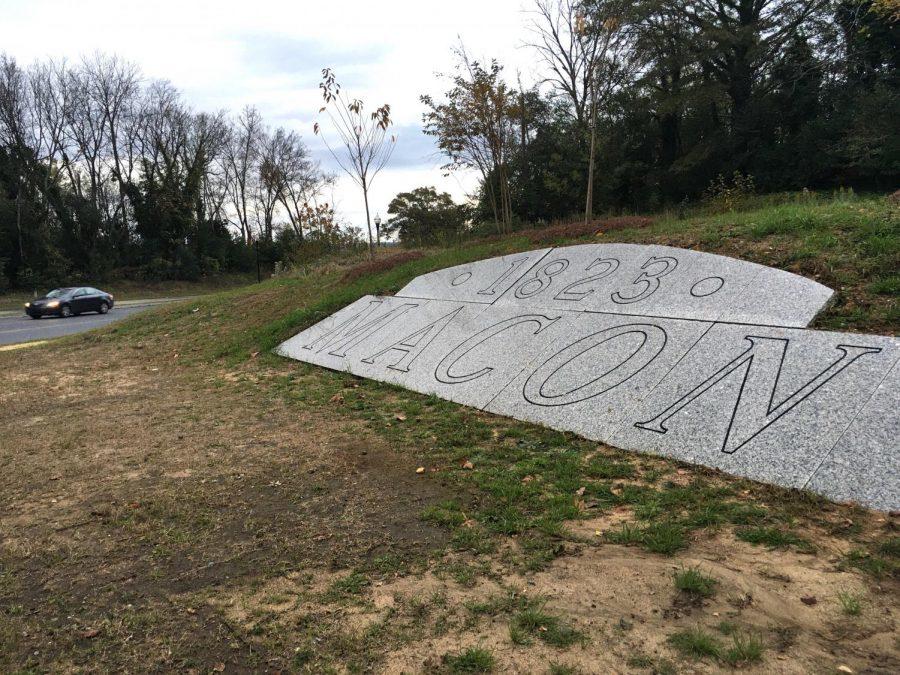
Caption
The old Macon welcome sign designed to greet visitors to the 1996 Centennial Olympic Games is now a gateway on Little Richard Penniman Boulevard to the Second Street Corridor entrance to downtown Macon.
Credit: Liz Fabian

The old Macon welcome sign designed to greet visitors to the 1996 Centennial Olympic Games is now a gateway on Little Richard Penniman Boulevard to the Second Street Corridor entrance to downtown Macon.
For more than a decade, Macon’s infamous welcome sign sat dismantled at Central City Park.
The $50,000 worth of chiseled pink granite was designed in 1996 to greet thousands of travelers buzzing through town on Interstate 75 during the Centennial Olympic Games in Atlanta.
It’s likely few of those passing by ever even saw the Macon marker noting 1823 as the year of the city’s founding. Now, you can’t miss it on a newly landscaped slope while cruising into downtown Macon along the Second Street Corridor.
As the community expected to host Olympic visitors from all around the world, the Macon 1996 committee worked with the Keep Macon Bibb Beautiful Commission to secure the 20,000 pounds of South Carolina rock to erect a sign at the city limits near the F. Emory Greene memorial bridge along the southbound lanes of the interstate.
Donations and grants from the Peyton Anderson and Knight foundations funded the project.
Georgia Department of Transportation and National Highway Transportation Safety Administration guidelines thwarted the effort as the sign could not sit upright along the busy highway and had to be nearly flush with the embankment, rendering it nearly invisible to those zooming by.
In a matter of days, ridicule began.
“Never have 10 tons of polished pink granite been so easy to hide in broad daylight, tucked along an embankment on the city’s doorstep,” a July 1996 article in The Telegraph stated.
A follow-up article nine years later referred to the “low-slug tombstone” as a “civic hood ornament” that “had to meet such stringent safety codes that it was regulated into invisibility.”
The newspaper writer stated it “may be the most ornate city-limits marker you have never seen.”
Local leaders tried to find a way to prop up the sign a bit, but solutions were hard to come by to conform to safety standards.
“It was placed in the worst place in the history of the world where you could only see it by helicopter,” former Macon Parks and Recreation director Doc Dougherty said at the time.
In 2010, Dougherty had to step in with an emergency budget request to remove the sign to make way for the widening of I-75. Despite the transportation department’s urgency, road work did not come close to that site for more than two years.
In fact, the project that redesigned the Pierce Avenue exit never touched the patch of land where the monument sat. You can still see the outline and the surrounding landscaping near that Red Oak Drive overpass.
While the chunks of granite rested in pieces behind the parks office, city leaders struggled to find a place suitable somewhere at the city limits or another entrance to downtown.
It wasn’t until after Macon consolidated with Bibb County in 2014 that Mayor Robert Reichert came up with the idea to erect the granite monument along the slope of the newly christened Little Richard Penniman Boulevard extension near Telfair Street and Edgewood Avenue.
Although it appears two pieces of the original composite are missing, the current placement, not far from the new railroad bridge, punctuates Reichert’s vision for the corridor to downtown Macon from the Mercer University Drive exit of I-75, said county spokesman Chris Floore.
“He wanted that really to be a gateway coming in and it made sense to have a sign there.”